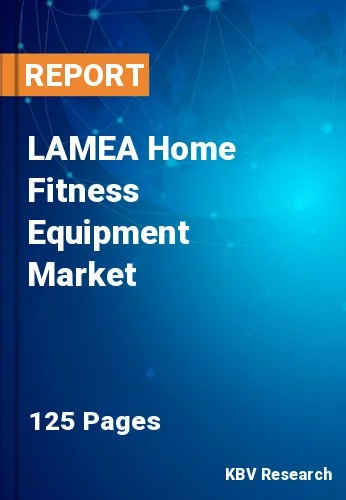The Latin America, Middle East and Africa Home Fitness Equipment Market would witness market growth of 10.8% CAGR during the forecast period (2023-2030).
Increasing discretionary income enables more individuals to purchase residential fitness equipment. When people have more money to invest, they are more likely to purchase high-end fitness apparatus with cutting-edge features and functions. The money that can be spent on exercise apparatus grows as disposable income rises. In addition, as urbanization and apartment living increase, there is a demand for compact, portable fitness equipment which can be stored in small living spaces.
The growing emphasis on health and wellness presents opportunities for suppliers o to collaborate with fitness trainers and wellness instructors to provide customized training programs to end users. Home fitness equipment providers may develop a more enjoyable and efficient workout experience for individuals and increase the perceived worth of their products by offering customized coaching and support. Virtual and augmented reality innovations create fresh possibilities for home fitness equipment manufacturers to develop immersive workout experiences and gamification functions.
Obesity in the Gulf states has reached epidemic proportions, particularly in the affluent oil-producing states. Obesity rapidly spreads and inevitably damages people's health, particularly in Brazil. The Brazilian health policy attempts to adapt to the changed economic and social environment caused by this epidemic. In addition, significant urban population growth is anticipated to encourage the adoption of a healthier lifestyle. This lifestyle is further supported by having a correct fitness regimen at home, increasing the product's regional consumption rate. Therefore, the increasing demand for fitness equipment by a larger proportion of the regional population along with the increasing obesity epidemic will aid in the expansion of the market in the coming years.
The Brazil market dominated the LAMEA Home Fitness Equipment Market by Country in 2022, and would continue to be a dominant market till 2030; thereby, achieving a market value of $217.1 million by 2030. The Argentina market is estimated to grow at a CAGR of 11.4% during (2023 - 2030). Additionally, The UAE market would exhibit a CAGR of 10.5% during (2023 - 2030).
Based on Price Point, the market is segmented into Mid Price, Low Price, and Premium Price. Based on Product, the market is segmented into Cardiovascular Training Equipment, Treadmills, Stationary Cycles, Rowing Machines, Free Weights, Power Racks, and Elliptical & Others. Based on Distribution Channel, the market is segmented into Dealers, Retailers, Direct Distribution, Online, and Others. Based on End User, the market is segmented into Households, Gym in Apartment, and Apartment. Based on countries, the market is segmented into Brazil, Argentina, UAE, Saudi Arabia, South Africa, Nigeria, and Rest of LAMEA.
Free Valuable Insights: The Worldwide Home Fitness Equipment Market is Projected to reach USD 11.8 Billion by 2030, at a CAGR of 7.9%
The market research report covers the analysis of key stakeholders of the market. Key companies profiled in the report include Icon Health & Fitness, Inc. (IHF Holding, Inc.), Johnson Health Tech Co., Ltd, Amer Sports, Core Health & Fitness, LLC, Nautilus, Inc., Technogym S.p.A., Hoist Fitness Systems, PureGym Limited (Pinnacle Bidco plc), Hammer Sport AG, and Rouge Fitness
By Price Point
By Product
By Distribution Channel
By End User
By Country
Our team of dedicated experts can provide you with attractive expansion opportunities for your business.

